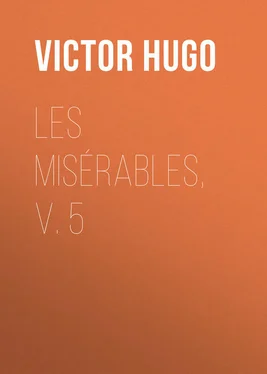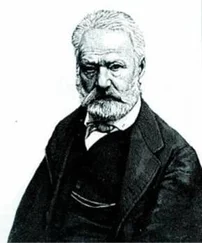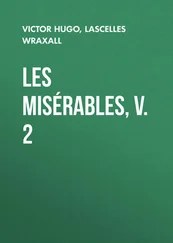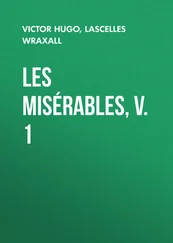Victor Hugo - Les Misérables, v. 5
Здесь есть возможность читать онлайн «Victor Hugo - Les Misérables, v. 5» — ознакомительный отрывок электронной книги совершенно бесплатно, а после прочтения отрывка купить полную версию. В некоторых случаях можно слушать аудио, скачать через торрент в формате fb2 и присутствует краткое содержание. Жанр: literature_19, foreign_antique, foreign_prose, на английском языке. Описание произведения, (предисловие) а так же отзывы посетителей доступны на портале библиотеки ЛибКат.
- Название:Les Misérables, v. 5
- Автор:
- Жанр:
- Год:неизвестен
- ISBN:нет данных
- Рейтинг книги:3 / 5. Голосов: 1
-
Избранное:Добавить в избранное
- Отзывы:
-
Ваша оценка:
- 60
- 1
- 2
- 3
- 4
- 5
Les Misérables, v. 5: краткое содержание, описание и аннотация
Предлагаем к чтению аннотацию, описание, краткое содержание или предисловие (зависит от того, что написал сам автор книги «Les Misérables, v. 5»). Если вы не нашли необходимую информацию о книге — напишите в комментариях, мы постараемся отыскать её.
Les Misérables, v. 5 — читать онлайн ознакомительный отрывок
Ниже представлен текст книги, разбитый по страницам. Система сохранения места последней прочитанной страницы, позволяет с удобством читать онлайн бесплатно книгу «Les Misérables, v. 5», без необходимости каждый раз заново искать на чём Вы остановились. Поставьте закладку, и сможете в любой момент перейти на страницу, на которой закончили чтение.
Интервал:
Закладка:
"Je suis tombé par terre,
C'est la faute à Voltaire;
Le nez dans le ruisseau,
C'est la faute à – "
He did not finish, for a second shot from the same marksman stopped him short. This time he lay with his face on the pavement, and did not stir again. This little great soul had flown away.
CHAPTER XVI
HOW A BROTHER BECOMES A FATHER
There were at this very moment in the Luxembourg garden – for the eye of the drama must be everywhere present – two lads holding each other's hand. One might be seven, the other five, years of age. As they were wet through with the rain they walked along sunshiny paths; the elder led the younger, both were in rags and pale, and they looked like wild birds. The younger said, "I am very hungry." The elder, who had already a protecting air, led his brother with the left hand, and had a switch in his right. They were alone in the garden, which was deserted, as the gates were closed by police order on account of the insurrection. The troops who had bivouacked there had issued forth for the exigences of the combat. How were these children here? Perhaps they had escaped from some guard-room where the door was left ajar; perhaps in the vicinity, at the Barrière d'Enfer, on the esplanade of the Observatory, or in the neighboring square overshadowed by the cornice, on which may be read, Invenerunt parvulum pannis involutum , there was some mountebank's booth from which they had fled; perhaps they had on the previous evening kept out of sight of the garden inspectors at the hour of closing, and had spent the night in one of those summer-houses in which people read the papers: the fact is, that they were wandering about, and seemed to be free. To be a wanderer, and to appear free, is to be lost, and these poor little creatures were really lost The two lads were the same about whom Gavroche had been in trouble, and whom the reader will remember, sons of Thénardier, let out to Magnon, attributed to M. Gillenormand, and now leaves fallen from all these rootless branches, and rolled along the ground by the wind.
Their clothes, clean in the time of Magnon, and which served her as a prospectus to M. Gillenormand, had become rags; and these beings henceforth belonged to the statistics of "deserted children," whom the police pick up, lose, and find again on the pavement of Paris. It needed the confusion of such a day as this for these two poor little wretches to be in this garden. If the inspectors had noticed these rags they would have expelled them, for poor little lads do not enter public gardens, and yet it ought to be remembered that as children they have a right to flowers. They were here, thanks to the locked gates, and were committing an offence; they had stepped into the garden and remained there. Though locked gates do not give a holiday to the keepers, and their surveillance is supposed to continue, it grows weaker and rests; and the inspectors, also affected by the public affairs, and more busied about the outside than the inside, did not look at the garden, and had not seen the two delinquents. It had rained on the previous evening, and even slightly on this morning, but in June, showers are of no great consequence. People hardly perceive, an hour after a storm, that this fair beauteous day has wept, for the earth dries up as rapidly as a child's cheek. At this moment of the solstice the midday light is, so to speak, poignant, and it seizes everything. It clings to and spreads itself over the earth with a sort of suction, and we might say that the sun is thirsty. A shower is a glass of water, and rain is at once drunk up. In the morning everything glistens, in the afternoon everything is dusty. Nothing is so admirable as verdure cleansed by the rain and dried by the sun; it is warm freshness. Gardens and fields, having water in their roots and sunshine in their flowers, become censers of incense, and smoke with all their perfumes at once. Everything laughs, sings, and offers itself, and we feel softly intoxicated: summer is a temporary Paradise, and the sun helps man to be patient.
There are beings who ask no more, – living creatures who, having the azure of heaven, say it is enough; dreamers absorbed in the prodigy, drawing from the idolatry of nature indifference to good and evil; contemplators of the Cosmos, radiantly distracted from man, who do not understand how people can trouble themselves about the hunger of one person, the thirst of another, the nudity of the poor man in winter, the lymphatic curvature of a small backbone, the truck-bed, the garret, the cell, and the rags of young shivering girls, when they can dream under the trees: they are peaceful and terrible minds, pitilessly satisfied, and, strange to say, infinitude suffices them. They ignore that great want of man, the finite which admits of an embrace, and do not dream of the finite which admits of progress, that sublime toil. The indefinite, which springs from the divine and human combination of the infinite and the finite, escapes them, and provided that they can be face to face with immensity, they smile. They never feel joy, but always ecstasy, and their life is one of abstraction. The history of humanity is to them but a grand detail: the All is not in it, the All remains outside of it. Of what use is it to trouble one's self about that item, man? Man suffers, it is possible, but just look at Aldebaran rising! The mother has no milk left, the new-born babe is dying. I know nothing of all that, but just look at the marvellous rose made by a sprig of hawthorn when looked at through a microscope; just compare the finest Mechlin lace with that! These thinkers forget to love, and the zodiac has such an attraction over them that it prevents them seeing the weeping child. God eclipses their soul, and they are a family of minds at once great and little. Homer belonged to it; so did Goethe, and possibly Lafontaine, magnificent egotists of the infinite, calm spectators of sorrow, who do not see Nero if the weather be fine; from whom the sun hides the pyre; who would look at a guillotining to seek a light effect in it; who hear neither cries nor sobs, nor the death-rattle nor the tocsin; for whom everything is good, since there is the month of May; who so long as they have clouds of purple and gold above their heads declare themselves satisfied; and who are determined to be happy until the radiance of the stars and the song of birds are exhausted.
These are darkly radiant, and they do not suspect that they are to be pitied. But they are certainly so, for the man who does not weep does not see. We must admire and pity them, as we would pity and admire a being at once night and day, who had no eyes under his brows, but a star in the centre of his forehead. The indifference of these thinkers is, according to some, a grand philosophy. Be it so; but in this superiority there is infirmity. A man may be immortal and limp, as witness Vulcan, and he may be more than man and less than man; there is immense incompleteness in nature, and who knows whether the sun be not blind? But in that case, whom to trust? Solem quis dicere falsum audeat? Hence, certain geniuses, certain human deities, star-men, might be mistaken? What is above at the summit, at the zenith, which pours so much light on the earth, might see little, see badly, not see at all? Is not that desperate? No: but what is there above the sun? God.
On June 6, 1832, at about eleven in the forenoon, the Luxembourg, solitary and depopulated, was delicious. The quincunxes and flower-beds sent balm and dazzlement into the light, and the branches, wild in the brilliancy of midday, seemed trying to embrace one another. There was in the sycamores a twittering of linnets, the sparrows were triumphal, and the woodpeckers crept along the chestnut, gently tapping holes in the bark. The beds accepted the legitimate royalty of the lilies, for the most august of perfumes is that which issues from whiteness. The sharp odor of the carnations was inhaled, and the old rooks of Marie de Medicis made love on the lofty trees. The sun gilded, purpled, and illumined the tulips, which are nothing but all the varieties of flame made into flowers. All around the tulip-beds hummed the bees, the flashes of these fire-flowers. All was grace and gayety, even the coming shower, for that relapse by which the lilies of the valley and honeysuckles would profit had nothing alarming about it, and the swallows made the delicious menace of flying low. What was there inhaled happiness: life smelt pleasantly, and all this nature exhaled candor, help, assistance, paternity, caresses, and dawn. The thoughts that fell from heaven were as soft as a babe's little hand that we kiss. The statues under the trees, nude and white, were robed in dresses of shadow shot with light; these goddesses were all ragged with sunshine, and beams hung from them on all sides. Around the great basin the earth was already so dry as to be parched, and there was a breeze sufficiently strong to create here and there small riots of dust. A few yellow leaves remaining from the last autumn joyously pursued one another, and seemed to be sporting.
Читать дальшеИнтервал:
Закладка:
Похожие книги на «Les Misérables, v. 5»
Представляем Вашему вниманию похожие книги на «Les Misérables, v. 5» списком для выбора. Мы отобрали схожую по названию и смыслу литературу в надежде предоставить читателям больше вариантов отыскать новые, интересные, ещё непрочитанные произведения.
Обсуждение, отзывы о книге «Les Misérables, v. 5» и просто собственные мнения читателей. Оставьте ваши комментарии, напишите, что Вы думаете о произведении, его смысле или главных героях. Укажите что конкретно понравилось, а что нет, и почему Вы так считаете.












